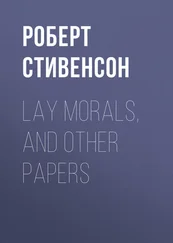Роберт Стивенсон - Virginibus Puerisque, and Other Papers
Здесь есть возможность читать онлайн «Роберт Стивенсон - Virginibus Puerisque, and Other Papers» — ознакомительный отрывок электронной книги совершенно бесплатно, а после прочтения отрывка купить полную версию. В некоторых случаях можно слушать аудио, скачать через торрент в формате fb2 и присутствует краткое содержание. Жанр: literature_19, foreign_antique, foreign_prose, на английском языке. Описание произведения, (предисловие) а так же отзывы посетителей доступны на портале библиотеки ЛибКат.
- Название:Virginibus Puerisque, and Other Papers
- Автор:
- Жанр:
- Год:неизвестен
- ISBN:нет данных
- Рейтинг книги:4 / 5. Голосов: 1
-
Избранное:Добавить в избранное
- Отзывы:
-
Ваша оценка:
- 80
- 1
- 2
- 3
- 4
- 5
Virginibus Puerisque, and Other Papers: краткое содержание, описание и аннотация
Предлагаем к чтению аннотацию, описание, краткое содержание или предисловие (зависит от того, что написал сам автор книги «Virginibus Puerisque, and Other Papers»). Если вы не нашли необходимую информацию о книге — напишите в комментариях, мы постараемся отыскать её.
Virginibus Puerisque, and Other Papers — читать онлайн ознакомительный отрывок
Ниже представлен текст книги, разбитый по страницам. Система сохранения места последней прочитанной страницы, позволяет с удобством читать онлайн бесплатно книгу «Virginibus Puerisque, and Other Papers», без необходимости каждый раз заново искать на чём Вы остановились. Поставьте закладку, и сможете в любой момент перейти на страницу, на которой закончили чтение.
Интервал:
Закладка:
If it did nothing else, this sublime and ridiculous superstition, that the pleasure of the pair is somehow blessed to others, and everybody is made happier in their happiness, would serve at least to keep love generous and great-hearted. Nor is it quite a baseless superstition after all. Other lovers are hugely interested. They strike the nicest balance between pity and approval, when they see people aping the greatness of their own sentiments. It is an understood thing in the play, that while the young gentlefolk are courting on the terrace, a rough flirtation is being carried on, and a light, trivial sort of love is growing up, between the footman and the singing chambermaid. As people are generally cast for the leading parts in their own imaginations, the reader can apply the parallel to real life without much chance of going wrong. In short, they are quite sure this other love-affair is not so deep seated as their own, but they like dearly to see it going forward. And love, considered as a spectacle, must have attractions for many who are not of the confraternity. The sentimental old maid is a commonplace of the novelists; and he must be rather a poor sort of human being, to be sure, who can look on at this pretty madness without indulgence and sympathy. For nature commends itself to people with a most insinuating art; the busiest is now and again arrested by a great sunset; and you may be as pacific or as cold-blooded as you will, but you cannot help some emotion when you read of well-disputed battles, or meet a pair of lovers in the lane.
Certainly, whatever it may be with regard to the world at large, this idea of beneficent pleasure is true as between the sweethearts. To do good and communicate is the lover’s grand intention. It is the happiness of the other that makes his own most intense gratification. It is not possible to disentangle the different emotions, the pride, humility, pity and passion, which are excited by a look of happy love or an unexpected caress. To make one’s self beautiful, to dress the hair, to excel in talk, to do anything and all things that puff out the character and attributes and make them imposing in the eyes of others, is not only to magnify one’s self, but to offer the most delicate homage at the same time. And it is in this latter intention that they are done by lovers; for the essence of love is kindness; and indeed it may be best defined as passionate kindness: kindness, so to speak, run mad and become importunate and violent. Vanity in a merely personal sense exists no longer. The lover takes a perilous pleasure in privately displaying his weak points and having them, one after another, accepted and condoned. He wishes to be assured that he is not loved for this or that good quality, but for himself, or something as like himself as he can contrive to set forward. For, although it may have been a very difficult thing to paint the marriage of Cana, or write the fourth act of Antony and Cleopatra, there is a more difficult piece of art before every one in this world who cares to set about explaining his own character to others. Words and acts are easily wrenched from their true significance; and they are all the language we have to come and go upon. A pitiful job we make of it, as a rule. For better or worse, people mistake our meaning and take our emotions at a wrong valuation. And generally we rest pretty content with our failures; we are content to be misapprehended by cackling flirts; but when once a man is moonstruck with this affection of love, he makes it a point of honour to clear such dubieties away. He cannot have the Best of her Sex misled upon a point of this importance; and his pride revolts at being loved in a mistake.
He discovers a great reluctance to return on former periods of his life. To all that has not been shared with her, rights and duties, bygone fortunes and dispositions, he can look back only by a difficult and repugnant effort of the will. That he should have wasted some years in ignorance of what alone was really important, that he may have entertained the thought of other women with any show of complacency, is a burthen almost too heavy for his self-respect. But it is the thought of another past that rankles in his spirit like a poisoned wound. That he himself made a fashion of being alive in the bald, beggarly days before a certain meeting, is deplorable enough in all good conscience. But that She should have permitted herself the same liberty seems inconsistent with a Divine providence.
A great many people run down jealousy, on the score that it is an artificial feeling, as well as practically inconvenient. This is scarcely fair; for the feeling on which it merely attends, like an ill-humoured courtier, is itself artificial in exactly the same sense and to the same degree. I suppose what is meant by that objection is that jealousy has not always been a character of man; formed no part of that very modest kit of sentiments with which he is supposed to have begun the world; but waited to make its appearance in better days and among richer natures. And this is equally true of love, and friendship, and love of country, and delight in what they call the beauties of nature, and most other things worth having. Love, in particular, will not endure any historical scrutiny: to all who have fallen across it, it is one of the most incontestable facts in the world; but if you begin to ask what it was in other periods and countries, in Greece for instance, the strangest doubts begin to spring up, and everything seems so vague and changing that a dream is logical in comparison. Jealousy, at any rate, is one of the consequences of love; you may like it or not, at pleasure; but there it is.
It is not exactly jealousy, however, that we feel when we reflect on the past of those we love. A bundle of letters found after years of happy union creates no sense of insecurity in the present; and yet it will pain a man sharply. The two people entertain no vulgar doubt of each other: but this pre-existence of both occurs to the mind as something indelicate. To be altogether right, they should have had twin birth together, at the same moment with the feeling that unites them. Then indeed it would be simple and perfect and without reserve or afterthought. Then they would understand each other with a fulness impossible otherwise. There would be no barrier between them of associations that cannot be imparted. They would be led into none of those comparisons that send the blood back to the heart. And they would know that there had been no time lost, and they had been together as much as was possible. For besides terror for the separation that must follow some time or other in the future, men feel anger, and something like remorse, when they think of that other separation which endured until they met. Some one has written that love makes people believe in immortality, because there seems not to be room enough in life for so great a tenderness, and it is inconceivable that the most masterful of our emotions should have no more than the spare moments of a few years. Indeed, it seems strange; but if we call to mind analogies, we can hardly regard it as impossible.
“The blind bow-boy,” who smiles upon us from the end of terraces in old Dutch gardens, laughingly hails his bird-bolts among a fleeting generation. But for as fast as ever he shoots, the game dissolves and disappears into eternity from under his falling arrows; this one is gone ere he is struck; the other has but time to make one gesture and give one passionate cry; and they are all the things of a moment. When the generation is gone, when the play is over, when the thirty years’ panorama has been withdrawn in tatters from the stage of the world, we may ask what has become of these great, weighty, and undying loves, and the sweet-hearts who despised mortal conditions in a fine credulity; and they can only show us a few songs in a bygone taste, a few actions worth remembering, and a few children who have retained some happy stamp from the disposition of their parents.
Читать дальшеИнтервал:
Закладка:
Похожие книги на «Virginibus Puerisque, and Other Papers»
Представляем Вашему вниманию похожие книги на «Virginibus Puerisque, and Other Papers» списком для выбора. Мы отобрали схожую по названию и смыслу литературу в надежде предоставить читателям больше вариантов отыскать новые, интересные, ещё непрочитанные произведения.
Обсуждение, отзывы о книге «Virginibus Puerisque, and Other Papers» и просто собственные мнения читателей. Оставьте ваши комментарии, напишите, что Вы думаете о произведении, его смысле или главных героях. Укажите что конкретно понравилось, а что нет, и почему Вы так считаете.












